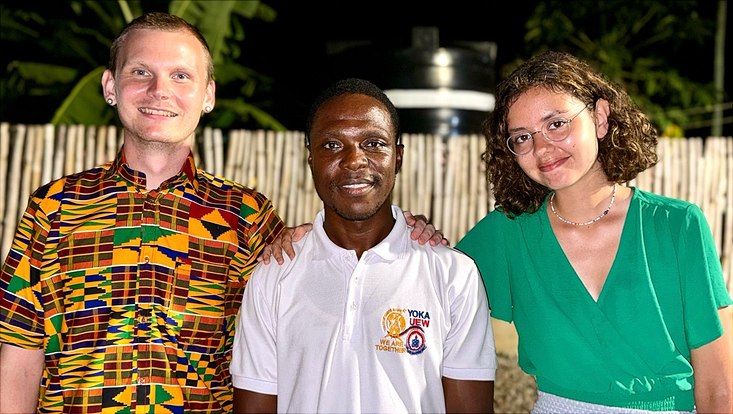Endangered biodiversity: How do we secure biodiversity?Senate Reception for Hamburger Horizonte Series
2 November 2023, by Newsroom editorial office
Environmental harm caused by humans, need for land, and many other factors are leading to a dramatic decrease in species diversity. Experts have been sounding the alarm about the impacts of this catastrophe. Securing biodiversity is not just a topic for this year’s Hamburger Horizonte series; it was also the focus of senate reception on Wednesday evening.
At present, competing crises have once again pushed species conservation into the background. How can we become more active and heed scientists’ call? At the panel discussion in Hamburg City Hall, roughly 450 guests listened to climate researcher Prof. Dr. Mojib Latif (president of the Academy of Sciences and Humanities in Hamburg) and conservationist Myriam Rapio (biodiversity manager at the University and deputy chair of the BUND) talk about the interplay between climate change and the loss of biodiversity. Lena Ganschow, science journalist, moderated.
Katharina Fegebank, Hamburg’s senator for science: “More species than ever before are now facing extinction. If we lose forests and moors, we also lose insects and birds, because everything is connected. In addition to climate change, species extinction is the great challenge of our time. Despite the enormous consequences for all of us, species extinction, its causes and effects, in the midst of our current major crises is still not public enough. This is why it is so important that Hamburger Horizonte is focusing this year on how to conserve biodiversity. Series like this facilitate critical reflection on scientific arguments in a public forum and they inspire us to finally get tackle urgent challenges. I thank the Körber-Stiftung, Universität Hamburg, and HIAS for organizing this important event.”
Dr. Thomas Paulsen, chair of the Körber-Stiftung: “At the Hamburger Horizonte, scientists and the public regularly discuss topics on which research and public discourse interests us all. The decrease in biodiversity is one of those topics. It is taking place the world over to a dramatic extent and yet it does not command public attention the way other crises do. This year, researchers, experts, practitioners, and Hamburg’s public at large are discussing paths to species conservation and are using the series as an active forum for dialogue.”
Prof. Dr. Hauke Heekeren, president of Universität Hamburg: “Science meets the public—at the Hamburger Horizonte 2023, everything this year focuses on the urgent societal matter of biodiversity. We at Universität Hamburg—University of Excellence are keenly interested in playing a more public role. With series like this, we and our partners want to make research visible and tangible and to facilitate exchange between scientific pursuit and society at large. As a flagship university, we are delighted to support this format within the framework of the Excellence Strategy. This year’s program is especially diverse: from an urban gardening workshop, discussions, and lecture series to a ‘conversation concert.’ Many researchers at the University are actively involved; the Loki Schmidt Garden, AStA (student council), and the Green Office have organized events. Many thanks for your commitment!”
Prof. Dr. Iris Wenderholm, spokesperson for the HIAS executive board: “Species extinction is the global catastrophe that is arguably the most repressed issue at the moment. We are less aware of it than of wars and the climate crisis but it is equally life-threatening—though it has so far received little public attention. As an interdisciplinary, international think tank, HIAS can develop multiple perspectives and ideas on the topic. Three of our fellows are taking part in Hamburger Horizonte 2023: Reinaldo Funes Monzote (University of Havana) is working on environmental history and biodiversity in the Caribbean; Emily Jones (Whitman College), who, along with Matthew Gandy (Cambridge University) is discussing the peculiarities of urban biodiversity on the basis of his film Natura urbana. The panel organized by HIAS will focus on ways to prevent species extinction and how the arts, the humanities, and the social sciences reflect these issues— because we all have to take responsibility: How can we undertake common efforts and pursue common strategies to conserve biodiversity?
Science and society exchanging ideas
Since 2017, the Hamburger Horizonte series has brought together renowned scientists, experts in the fields of policy, business, and culture, and the Hamburg public together. The goal is open exchange on topics on which scientific work is of vital interest to society at large. The series always focuses on a central topic of sociopolitical interest, which is then discussed in multiple panels, at keynote lectures, and in conversations. In the past, for example, we have looked at what it means to be European, global health issues, the collapse of political orders, and threats to freedom. The Körber-Stiftung, Universität Hamburg, and HIAS organize the series.
The current series on endangered diversity will look this fall at the ever-increasing extinction of species around the globe and ask how we can better conserve biodiversity. The Hamburg public can learn more about biodiversity at films, workshops, discussions, lecture series, and guided tours until 13 November. Many of the activities can be attended virtually.
All events free
All of the events are free. However, you do need to sign up for each event on the Hamburger Horizonte website (in German only). There you can also find the entire program and more information.
The Hamburger Horizonte series are co-financed by the Körber-Stiftung and Universität Hamburg. They draw on resources from the Excellence Strategy of the Federal and State Governments. The goal is to support scientific dialogue with the public at large with a focus on current research findings; to promote the visibility and networking of the fellows at the Hamburg Institute for Advanced Study (HIAS) as they pursue their work in Hamburg; and to internationalize Hamburg’s academic profile. HIAS is funded by the Ministry of Science, Research, Equalities and Districts in Hamburg and the City of Hamburg within the scope of the Excellence Strategy of the Federal and State Governments.








